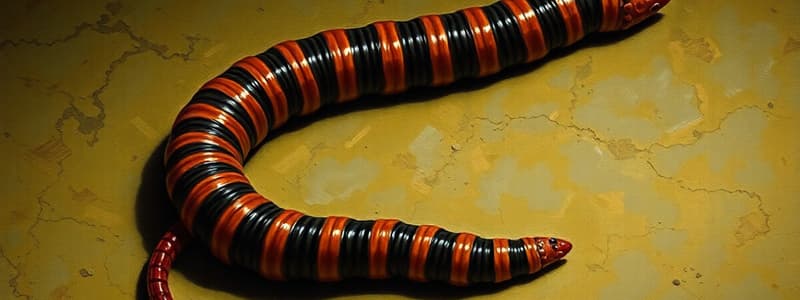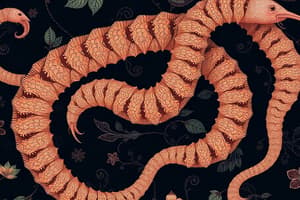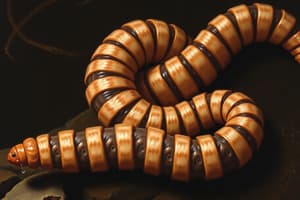Podcast
Questions and Answers
What characteristic is true of organisms classified in the phylum Annelida?
What characteristic is true of organisms classified in the phylum Annelida?
- They possess a hard exoskeleton.
- They are segmented worms. (correct)
- They are exclusively marine species.
- They have a radial body symmetry.
Which of the following is NOT a category of body organization found in animals?
Which of the following is NOT a category of body organization found in animals?
- Polycoelomata (correct)
- Pseudocoelomata
- Eucoelomata
- Acoelomata
What does the term 'Eumetazoa' refer to in the animal kingdom?
What does the term 'Eumetazoa' refer to in the animal kingdom?
- Animals that are all aquatic.
- Animals that reproduce asexually.
- Animals without true tissue.
- Animals with true tissues. (correct)
Which of the following is an example of a triplooblastic organism?
Which of the following is an example of a triplooblastic organism?
Which class of Annelida includes leeches?
Which class of Annelida includes leeches?
Flashcards
Annelida Phylum
Annelida Phylum
Segmented worms, including marine, freshwater, and terrestrial species, and leeches.
Annelida Characteristics
Annelida Characteristics
Soft body, segmented, 15,000 species, worldwide.
Annelida Examples
Annelida Examples
Marine worms, freshwater worms, terrestrial worms, and leeches.
Annelida Diversity
Annelida Diversity
Signup and view all the flashcards
Segmented Worms
Segmented Worms
Signup and view all the flashcards
Study Notes
Phylum Annelida
- Commonly known as segmented worms
- 15,000 species
- Worldwide distribution
- Soft bodies
- Sizes range from less than 1mm to many meters
- Include marine worms, freshwater worms, terrestrial worms, and leeches
Annelida Characteristics
- Bilaterally symmetrical and triploblastic
- Segmented body composed of metameres (metamerically segmented)
- Eucoelomate
- Coelom lined by mesoderm
- Coelom filled with fluid, acting as a buffer for movement
Annelida Body Wall
- Integument: single cell layer epidermis with mucous glands secreting a moist cuticle (protective layer)
- Muscles: outer circular and inner longitudinal muscle layers, each segment's muscles are independent of the other segments
- Respiration: occurs through skin, parapodia, or gills
Annelida Circulation
- Closed circulatory system
- Blood vessels run length of body and branch into each segment
- Blood contains hemoglobin, increasing oxygen transport ability
- Includes a pharynx, stomach, intestine, and accessory glands
Annelida Nervous System
- Well-developed nervous system
- Ventral nerve cord
- Ganglia (masses of nerve cells) at the head (primitive brain)
- Segmental nerves branch from ganglia
Annelida Excretion
- Excretion through nephridia
- One pair per metamere (segment)
- Similar to kidneys, filtering excess water and nitrogenous wastes
Annelida Reproduction
- Hermaphroditic (both male and female reproductive organs)
- Fertilization is external
- Cocoons are formed by the clitellum
- Some species have a free-swimming trochophore larva
Class Oligochaeta
- Primarily freshwater and terrestrial
- Lack parapodia
- Have few, short setae (bristles)
- Have a clitellum (saddle-like swelling)
- Examples: earthworms
Class Polychaeta
- Primarily marine
- Have parapodia (paddle-like appendages) with chaetae (bristles)
- Well-developed head
- Examples: sand worms, clam worms
Class Hirudinea (Leeches)
- Primarily freshwater, some marine or terrestrial
- Lack parapodia and setae
- Possess suckers for attachment
- Mostly fluid feeders (bloodsuckers, carnivores on small invertebrates)
- Clitellum apparent only during reproduction
- Examples: medicinal leech
Medical Importance
- Leech saliva contains antiseptic chemicals and hirudin (anticoagulant)
- Used in reconstructive surgery to promote blood circulation
Studying That Suits You
Use AI to generate personalized quizzes and flashcards to suit your learning preferences.




